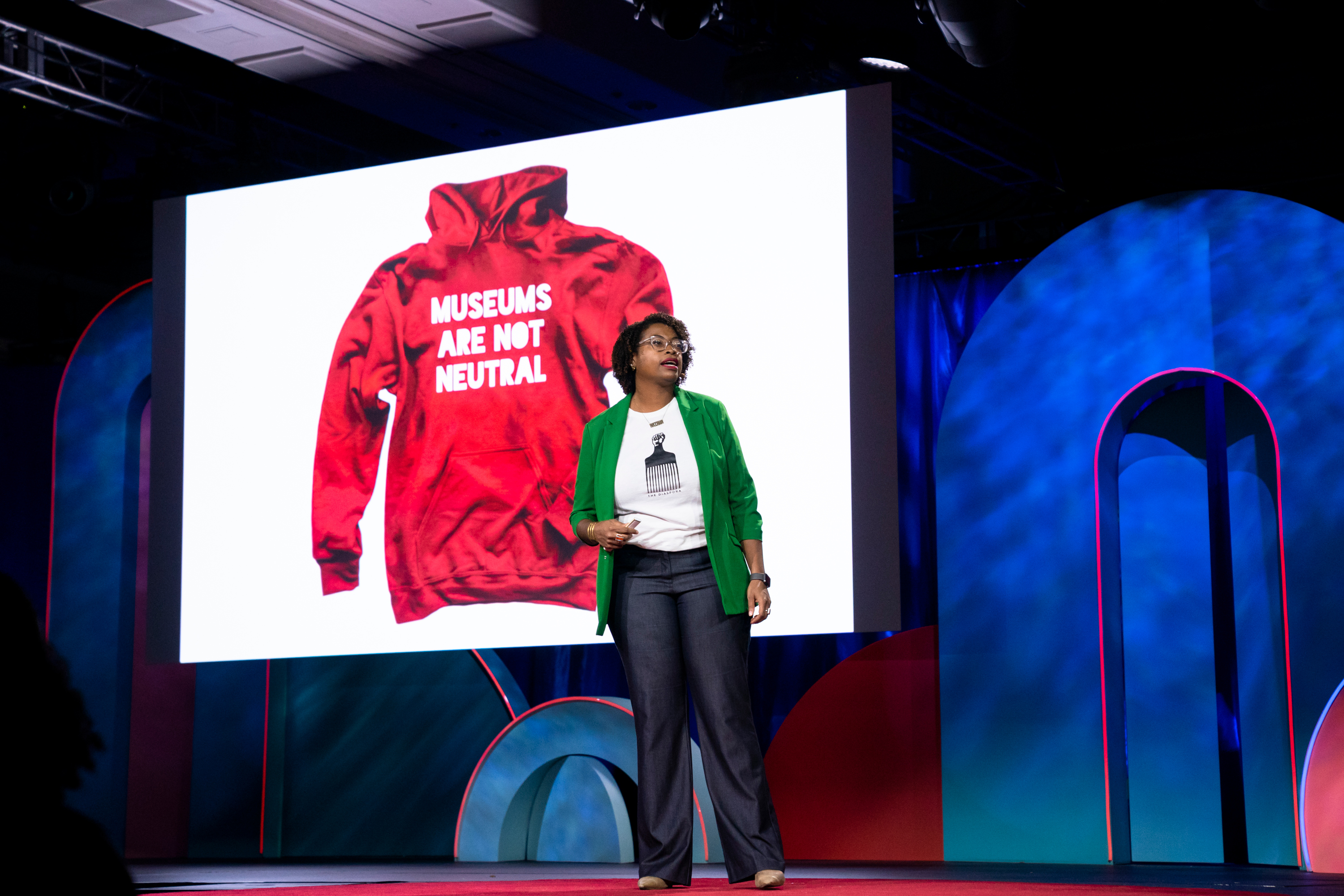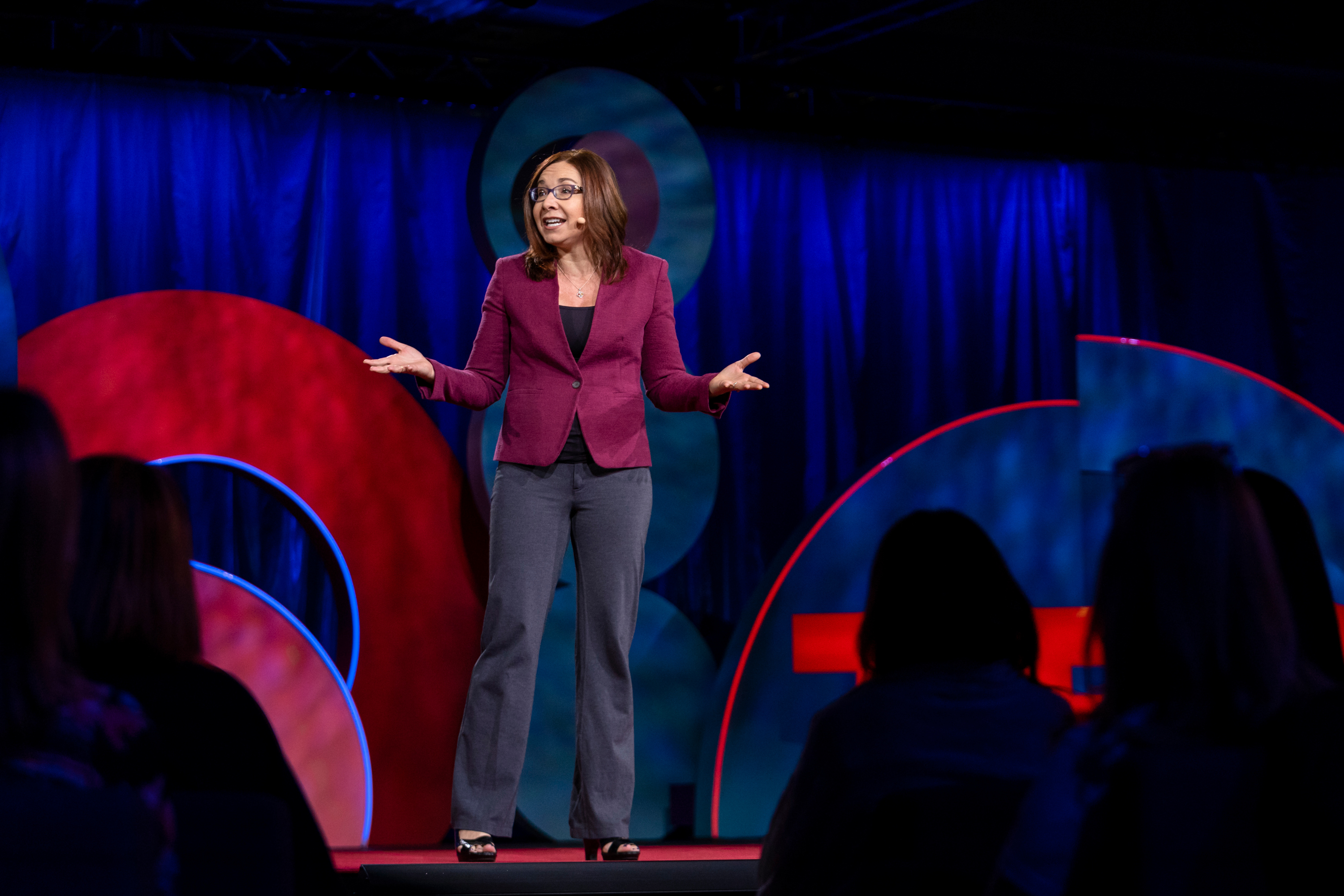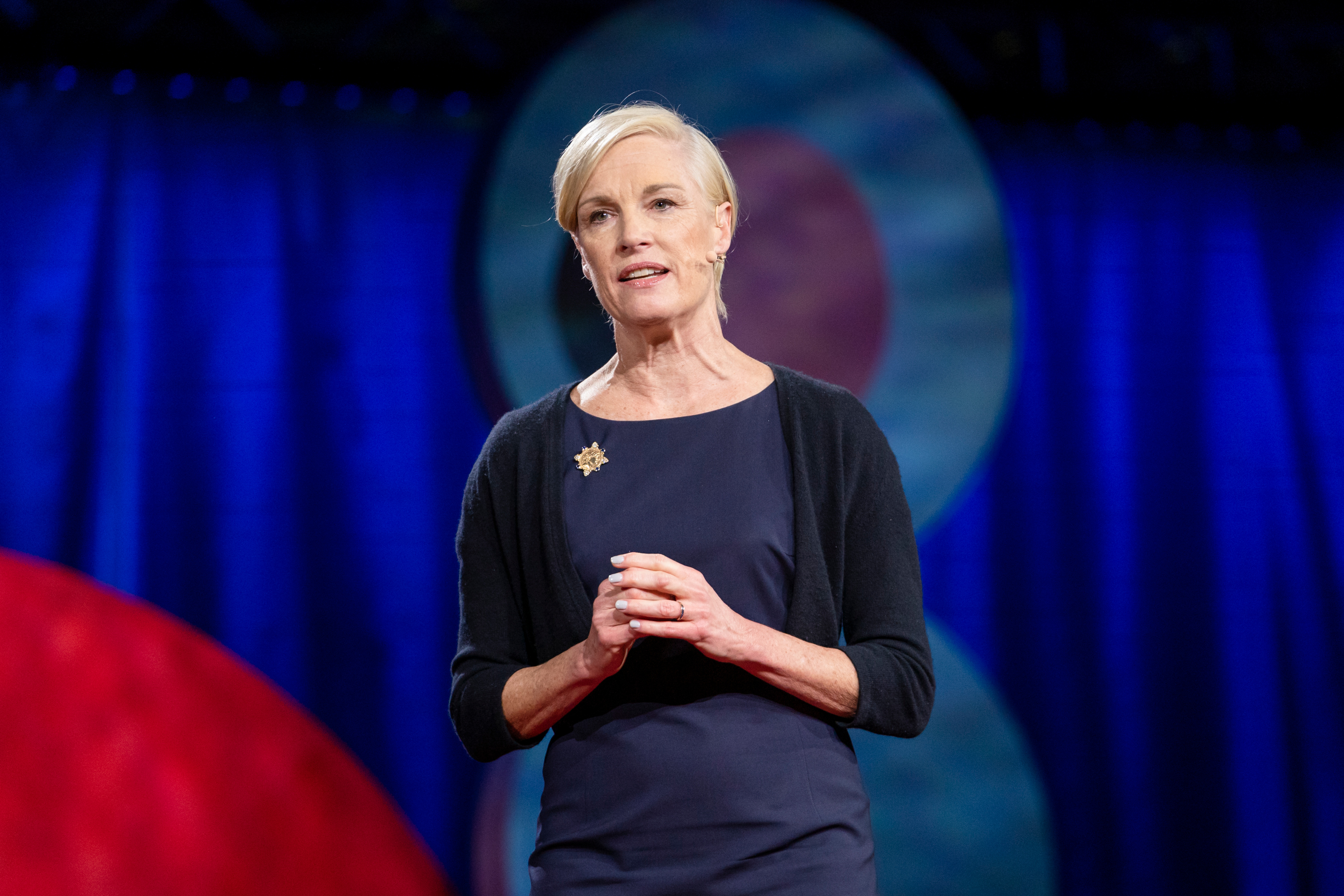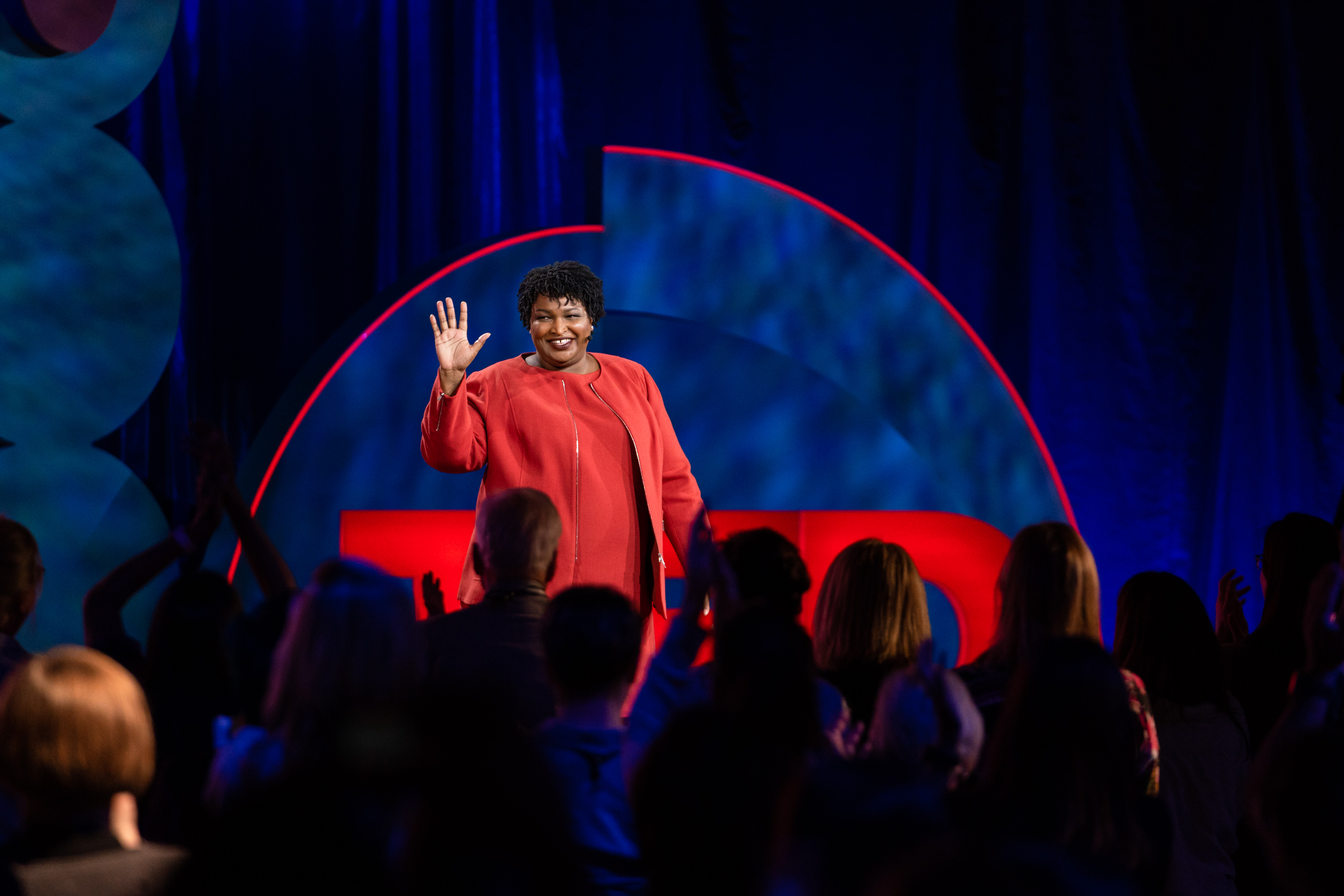
Ariana Curtis is a museum curator who imagines how museums can honor the lives of people both extraordinary and everyday, prominent and hidden. She speaks at TEDWomen 2018: Showing Up, on November 30, 2018, in Palm Springs, California. Photo: Callie Giovanna / TED
After three days of astonishing speakers and bold ideas, you may be asking yourself: Where do we go now? The answer: forward.
The final session of TEDWomen 2018, hosted by TEDWomen curator Pat Mitchell, featured a dynamic lineup of forward thinkers: Ariana Curtis, Galit Ariel, Majd Mashharawi, Soraya Chemaly, Katharine Hayhoe, Cecile Richards, Kakenya Ntaiya, Farida Nabourema and surprise speaker Stacey Abrams. All together, they helped us look at how things are now — and imagine how they could be.
The stories of everyday women are essential, too. Public representations of women are too often enveloped in the language of the extraordinary, says museum curator Ariana Curtis. The stories of extraordinary women are seductive, but they are limited — by definition, to be extraordinary is to be non-representative, atypical. Curtis is dedicated to women’s history that reflects both the remarkable and the quotidian. “If we can collectively apply the radical notion that women are people, it becomes easier to show women as people are — familiar, diverse, present,” she says. As the curator for Latinx Studies at the Smithsonian National Museum of African American History and Culture, she’s empowered to change the current narrative where, she says, “respectability politics and idealized femininity influence how we display women and which women we choose to display.” This in turn leads to the exclusion “of the everyday, the regular, the underrepresented and usually the non-white.” As she says: “I will continue to collect from extraordinary history-makers. Their stories are important. But what drives me to show up today and every day is the simple passion to write our names in history, display them publicly for millions to see, and,” as she quotes poet Sonia Sanchez, to “walk in the ever-present light that is women.”
Exploring new worlds, right here on Earth. Technologist Galit Ariel believes that space is humanity’s final frontier — but she’s not talking about the dark, cold expanse between the planets and stars. She’s talking about the mind-blowing, space-bending technology known as augmented reality or AR. “While similar immersive technologies such as virtual reality aspire to transport you into a completely parallel world, augmented reality adds a digital layer directly onto or within our existing physical environment,” she says. AR can map, understand and react to physical spaces; imagine your entire living room transformed into a lush jungle, for instance, as a jaguar hunts for prey between your sofa and the door. Since our bodies and minds are wired for rich physical interactions, Ariel says, it’s crucial that we create technologies that help us be more present and connected to the world — instead of inside our phones. “Technology will no longer be something that happens elsewhere, but a powerful tool to explore and extend the world, society and ourselves,” she says. In the near future, expect to see more and better platforms — things like wearables and maybe even devices directly embedded into our bodies (Black Mirror, anyone?). “Amazing journeys await us right here on planet Earth,” Ariel says. “Bon voyage.”

After more than 150 failed experiments, Majd Mashharawi helped create a building block out of the ashes and rubble of demolished houses in Gaza. Now she’s helping bring solar energy to the area too. She speaks at TEDWomen 2018: Showing Up, on November 30, 2018, in Palm Springs, California. Photo: Marla Aufmuth / TED
Rebuilding Gaza, one brick and one solar cell at a time. “For more than ten years, I and two million people back home have been living in darkness, locked between two borders that are nearly impossible to leave,” says Majd Mashharawi. She lives in Gaza, and she reflects on growing up with “a whole lot of nothing” in the conflict-ridden region — and deciding that she would create something from that nothing. She gravitated toward two urgent needs: for building materials and for electric power, both in short supply in Gaza. After months of research and more than 150 failed experiments, Mashharawi has created a building block that’s made out of the ashes and rubble of demolished houses. The block is light, cheap and strong, and with it, Mashharawi launched the Gaza-based startup GreenCake — which has trained both women and men graduates in manufacturing. “This block is not just a building block,” she says. “It changed the stereotype about women in Gaza, which stated: ‘This type of work is just for men.'” Now Mashharawi has turned her attention to electricity, helping to create a smart solar kit for energy and light. With a business model centered on sharing the solar units among several families, the device is catching on — returning electric power to the hands of people, one solar cell at a time.
Changing the cultural conversation about women and anger. Even though we live in an age where unisex bathrooms and unisex clothing exist, some emotions still get assigned to a single sex. “In culture after culture, anger is reserved as the moral property of boys and men,” says journalist Soraya Chemaly, author of Rage Becomes Her: The Power of Women’s Anger. In contrast, angry women are seen as unhinged, irrational or shrill, and they’re often mocked, penalized or punished if they let out their rage (with women of color facing the most severe consequences). Instructions to use one’s “nice” voice and keep smiling start early on, says Chemaly: “As a girl, I learnt that anger is better left entirely unvoiced.” Instead, it emerges in the form of tears, headaches, stomach-churning discontent or teeth-grinding frustration. Turning anger into a no-go zone for women is not only damaging to psyches and bodies, it also prevents real gender equity, Chemaly says: “Societies that don’t respect women’s anger don’t respect women.” As she notes of anger, “If it’s poison, it is also the antidote. We have an anger of hope.” She calls for people of all genders to accept — and not reject — women’s rage, and for women to turn their rage into a seismic force for compassion, justice, accountability and creativity. (Read an excerpt from her book on TED Ideas.)

The best way to make progress on climate change? Keeping talking about it, says climate scientist Katharine Hayhoe. “To care about a changing climate, we don’t have to be a liberal or a political activist,” she says at TEDWomen 2018: Showing Up, on November 30, 2018, in Palm Springs, California. Photo: Marla Aufmuth / TED
Let’s talk about climate change — from the heart. Climate scientist Katharine Hayhoe is a professor at Texas Tech University, which is in Lubbock, Texas, a place once named the second most conservative town in America. When it comes to talking about climate change there, people immediately see it as political. And that’s not specific to Texas, Hayhoe says — across the US, climate change is viewed as a partisan issue. But in her mind, “to care about a changing climate, we don’t have to be a liberal or a political activist,” she says. “We just have to be a human who wants this planet to be a safe home for all of us.” So, how can we speak about climate change without making it political? Hayhoe suggests an approach less focused on the science and more focused on the heart — by starting the conversation from a place of agreement and mutual respect, and then connecting the dots to why climate change matters personally to you. For instance, maybe climate change affects the places you live, your grandchildren or your favorite outdoor hobbies. It’s not a good idea to paralyze people with fear, Hayhoe says. After all, solutions aren’t that far out of reach. Even in Hayhoe’s home state of Texas, almost 20 percent of the state’s electricity comes from renewable sources. “Working together, we can fix it,” she says. “We can’t give in to despair. We have to go out and look for the hope we need to inspire us to act — and that hope begins with a conversation, today.”

We need to build a sustained global movement for women’s equality, says Cecile Richards — one that’s intersectional and inter-generational. And we can do this without waiting for instructions or permission. She speaks at TEDWomen 2018: Showing Up, on November 30, 2018, in Palm Springs, California. Photo: Marla Aufmuth / TED
The next political revolution: women. The former president of Planned Parenthood, Cecile Richards has been fighting for women’s rights her entire life. On the TEDWomen stage, she has an urgent message — if women are not at the table, then they are on the menu. What does this mean? Well, though women have made great strides in the last 100 years, they still lack real political power. She offers another way of looking at things: “If half of Congress could get pregnant, we would finally quit fighting about birth control and Planned Parenthood.” So just how do women go about building this political revolution? Richards says that it’s already started and proven by events like the 2017 Women’s March in DC and the unprecedented amount of women who ran for office and won in the 2018 US elections. Now we need to build a sustained global movement for women’s equality — one that’s intersectional and inter-generational. We can do this without waiting for instructions or permission to make a difference, she says, by being vocal about what we stand for, realizing nobody is free until everybody’s free and voting in every election. “One of us can be ignored, two of us can be dismissed — but together, we’re a movement,” she says. “And we’re unstoppable.”
How one girl’s dream transformed a community. Kakenya Ntaiya dreamed of getting an education. But in her village of Enoosaen, Kenya, Maasai girls were expected to undergo female genital mutilation (FGM) at puberty, get married and give up school. So Ntaiya negotiated with her father: she would undergo FGM, but in return, she would stay in school. Eventually, she left for college in the United States, vowing to return to repay her community for their support. Ntaiya returned, founded the education NGO Kakenya’s Dream, and built the Kakenya Center for Excellence, a school where girls can live and study safely. Believing that empowering a community must extend beyond the girls themselves, Ntaiya works with parents, grandmothers and community leaders to make sure they know how well their girls are doing. And realizing that nothing will truly change if boys grow up “with the same mindset as their fathers before them,” she helped launch a program to teach children about gender equality, health and human rights. Kakenya’s Dream shows that “it truly does take a village to make this kind of a dream come true.”
Everything you know about autocracy is wrong. There’s a certain naiveté in the way the press covers dictatorship, activist Farida Nabourema tells us. During interviews about her struggle against Togolese dictator Faure Gnassingbé, her interviewers often emphasize his abuses, “because they believe that will gain attention and sympathy” for activists. “But in reality, it serves the purpose of dictators — it helps them advertise their cruelty,” and consolidates their grip on power. Instead, why not focus on “the stories of resistance, the stories of defiance, the stories of resilience,” and inspire people to fight back? That naiveté extends to citizens of democratic countries, who often assume that oppressed countries are less “morally advanced,” that the world is moving towards freedom, and that very soon, dictatorships will disappear. The reality is much different, Nabourema warns us. “No country is actually destined to be oppressed, but at the same time, no country or no people are immune to oppression or dictatorship.” Any country with a large concentration of power, a reliance on propaganda, excessive militarization, and a disdain for human rights risks falling into autocracy — and we should all be vigilant.

After a highly contested 2018 campaign for governor of Georgia, Stacey Abrams offers insights on how to move forward — and some hints at what her future might hold. She was the surprise final speaker at TEDWomen 2018: Showing Up, on November 30, 2018, in Palm Springs, California. Photo: Marla Aufmuth / TED
Be aggressive about your ambition. Stacey Abrams‘s 2018 campaign for governor of Georgia was watched across the world. The first black woman to be nominated by a major party for governor, she lost after a hard-fought race. Now she’s the surprise speaker onstage at TEDWomen 2018, where, in an electrifying talk, she shares the lessons she learned from her campaign, advice on how to move forward through setbacks — and some hints at what her future might be. Read a full recap of her talk here.